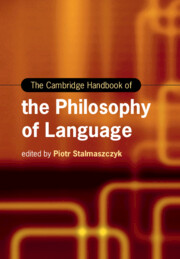Book contents
- The Cambridge Handbook of the Philosophy of Language
- Cambridge Handbooks in Language and Linguistics
- The Cambridge Handbook of the Philosophy of Language
- Copyright page
- Contents
- Figures
- Tables
- Contributors
- Preface
- 1 Philosophy of Language: Definitions, Disciplines, and Approaches
- Part I The Past, Present, and Future of Philosophy of Language
- 2 The History of the Philosophy of Language before Frege
- 3 How the Philosophy of Language Grew Out of Analytic Philosophy
- 4 Philosophy of Language for the Twenty-First Century
- Part II Some Foundational Issues
- Part III From Truth to Vagueness
- Part IV Issues in Semantics and Pragmatics
- Part V Philosophical Implications and Linguistic Theories
- Part VI Some Extensions
- References
- Index
4 - Philosophy of Language for the Twenty-First Century
from Part I - The Past, Present, and Future of Philosophy of Language
Published online by Cambridge University Press: 12 November 2021
- The Cambridge Handbook of the Philosophy of Language
- Cambridge Handbooks in Language and Linguistics
- The Cambridge Handbook of the Philosophy of Language
- Copyright page
- Contents
- Figures
- Tables
- Contributors
- Preface
- 1 Philosophy of Language: Definitions, Disciplines, and Approaches
- Part I The Past, Present, and Future of Philosophy of Language
- 2 The History of the Philosophy of Language before Frege
- 3 How the Philosophy of Language Grew Out of Analytic Philosophy
- 4 Philosophy of Language for the Twenty-First Century
- Part II Some Foundational Issues
- Part III From Truth to Vagueness
- Part IV Issues in Semantics and Pragmatics
- Part V Philosophical Implications and Linguistic Theories
- Part VI Some Extensions
- References
- Index
Summary
Since its inception at the end of the nineteenth and the beginning of the twentieth centuries, modern philosophy of language has moved, first from offering new approaches to solving traditional philosophical problems, next to providing a conception of meaning and interpretation for languages of logic, and finally to laying the foundations of the empirical study of natural languages. So far in the twenty-first century, the latter focus has been dominant. Because the foundations of linguistic science are incomplete, this focus is likely to remain central for decades to come.
- Type
- Chapter
- Information
- The Cambridge Handbook of the Philosophy of Language , pp. 89 - 104Publisher: Cambridge University PressPrint publication year: 2021

